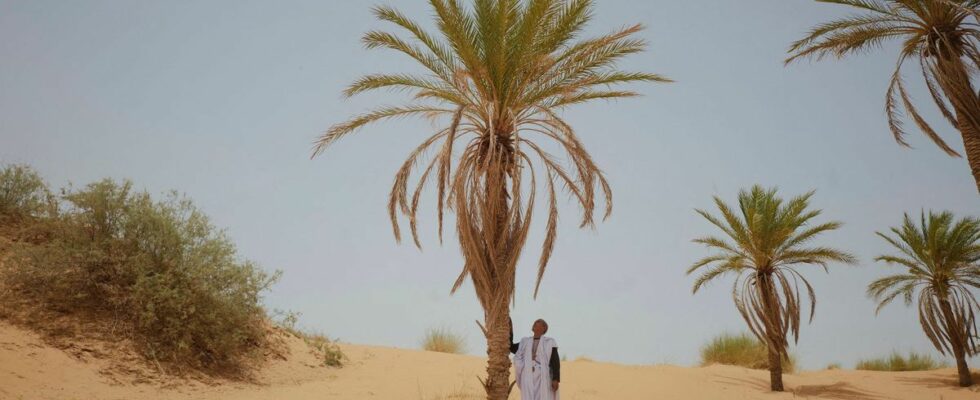Published on
Updated
Reading 3 min.
There is a look of desolation on the melancholy face of Aliene Haimoud as he looks at the yellowed, sand-covered date palms, dying when they are not already dead.
On the small dune in Mauritania where he observes the oasis that saw him grow up, the advance of the desert is striking. The trees are gradually swallowed up by a mass of sand that devours everything.
In Azougui, near Atar, about 450 km northeast of the capital Nouakchott, residents are preparing for the Guetna, the date harvest.
This popular event, rooted in a long nomadic tradition, sees the children of the country return to the village to collect these small sweet fruits, the main wealth of the region. Large family celebrations are organized at this time. “You go from 10 to 1,000 friends,” summarizes a cheerful resident.
So when a palm tree dies, a little bit of the life of each village is extinguished.
“Because of the sand, people are forced to move elsewhere, because there can no longer be a harvest here.“, laments, his voice quavering, Mr. Haimoud, president of the association for the participatory management of the oasis.
Nearly 20,000 palm trees have died since the 1980s and his village is becoming emptier every year, he says. The state has tried to slow down desertification by planting trees that are supposed to repel the onslaught of sand, but the variety chosen, mesquite, has caused the soil to dry out further, further weakening the surrounding palm trees.
Seventy kilometres further south, the oasis of M’Heiret, a green haven in the heart of the desert, has also been decimated. Around 6,000 palm trees, weakened by years of drought, were swept away two years ago by the massive flooding of a wadi – a watercourse that forms episodically during the rainy season.
The palm trees now lie on the riverbed, which is completely dry at this time of year.This place was full of palm trees“regrets Amou Dehah, who was mayor of the village at that time.”Their owners are still there but they have nothing left.“.
“Our only resource for living”
“If there are no more palm trees, there is no more work. If there is no more work, there is no more money.” he breathes.
“We need to find a solution. Without it, people will live elsewhere because it is our only resource for living.” he explains.
At his side, Mohamed Mahmoud Ould Brihm, 56, worries about his fifty palm trees, passed down from generation to generation and close to the wadi.Of course I’m afraid of losing everything. I’m even afraid that my house will be destroyed.” he said.
The inhabitants of this small town, renowned for the quality and variety of its dates, are calling for the construction of a dam, which they say would serve as a bulwark against further torrential rains and create favourable conditions for market gardening.
“The dam is the best solution“, says Houdy Sidina, professor of biology and agronomy at the University of Nouakchott.”It helps combat drought, feed palm trees through irrigation and combat flooding“.
He cites as an example in the region the Segueil dam, inaugurated in 2019, which irrigates the oases permanently and has transformed the lives of local populations.
The state has also improved irrigation systems, provided solar panels and planted new date palms offered to poor farmers, underlines Sidi Ahmed, president of the associative network for sustainable development of oases.
In his garden of about twenty palm trees, near Atar, Moustapha Chibany picks a date and brings it to his mouth. Succulent.What interests me is not the economic aspect, but the love of dates. Without them, there would be no life here, in such hostile conditions.” he said.
According to him, it is above all by sharing the most effective techniques, the fight against waste and the promotion of better quality species that the sector will be able to revive itself and face competition from dates from the Maghreb.
